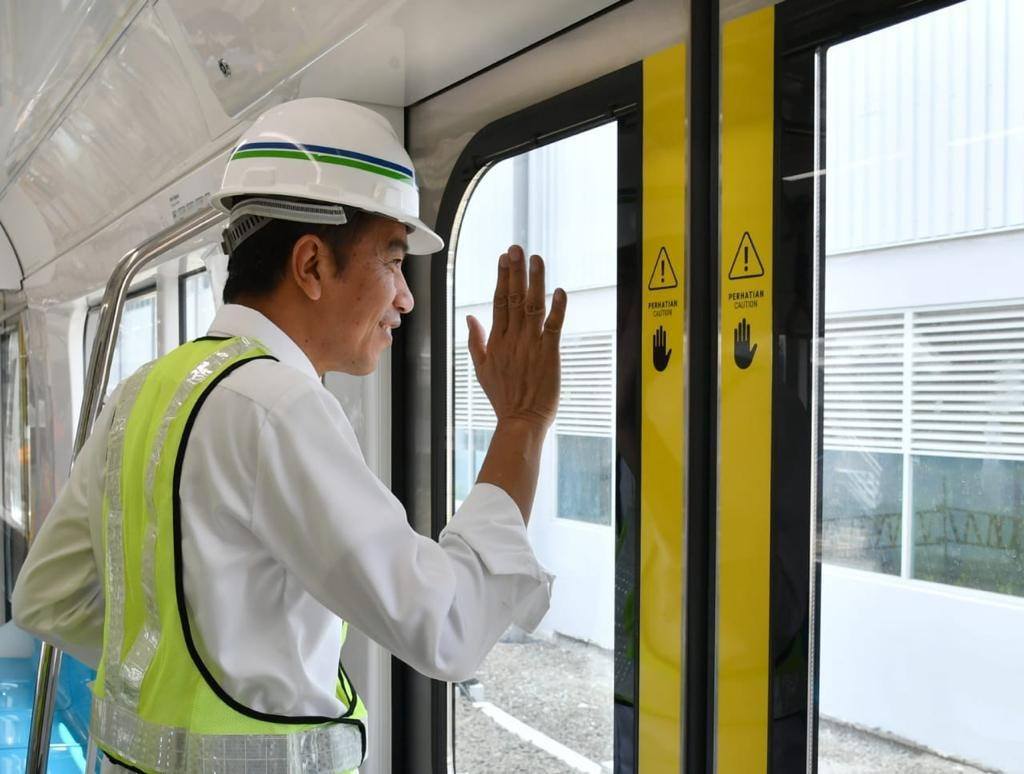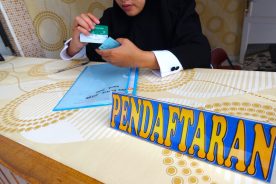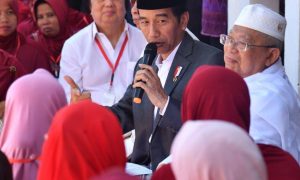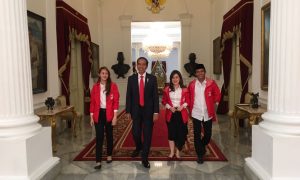On 31 December 2018, President Joko Widodo (Jokowi)’s end-of-year messages on his social media channels were all about infrastructure. His Facebook, Twitter, and Instagram together posted a short animated video of new airports, railways, toll roads, and ports, which asked the question “liburan naik apa?” (“how will you travel these holidays?”). A couple of months earlier, the Office of the President (KSP) marked the fourth anniversary of Jokowi’s inauguration by sharing a video that mostly showed the president’s achievements in infrastructure development.
Infrastructure is at the heart of Jokowi’s presidency and his re-election campaign. The ubiquitous media image of the president is of him wearing a construction worker’s white helmet—a president who always has the time to kick off, inspect, and inaugurate infrastructure projects across Indonesia. He boasts that in his first four years in office he has built 947km of toll roads, 3,432km of highways, 39km of bridges, 10 new airports, 19 ports, and 17 dams, among other things. In the second televised debate of the presidential election, on 17 February, Jokowi’s opening remarks included the claim that the village funds he had distributed have resulted in the completion of 191,000km of village roads and 58,000 irrigation facilities in the last three years, benefiting farmers at the grassroots level.
Jokowi is a firm believer that massive infrastructure development will boost the Indonesian economy. In his latest annual speech to the People’s Consultative Assembly (Majelis Permusyawaratan Rakyat or MPR), traditionally held one day before Indonesia’s independence day on August 17, he underscored the importance of infrastructure, saying that it would not only improve productivity and competitiveness but also create new economic bases across the archipelago.
There is little to argue about in that regard. Development economists would agree that building infrastructure enables higher mobility, reduces logistics costs, and in turn promotes more inclusive economic development. Keynesians would also support Jokowi’s massive spending on infrastructure, because such expansionary fiscal policy will stimulate growth. And all would agree that Indonesia needs to build infrastructure fast to catch up with other emerging economies: according to the World Economic Forum’s Global Competitiveness Report 2018, Indonesia’s infrastructure scored 67 out of 100, with poor performance particularly on indicators such as road connectivity, quality of roads, railway density, and liner shipping connectivity. The country is ranked 71 out of 140 countries surveyed, below India (63), Thailand (60), Malaysia (32), China (29), and Singapore (1).
Who’ll pay for Indonesia’s national health insurance?
Politicians need to make some hard decisions to make the system financially sustainable.
State-owned enterprise: a useful tool
There are at least two practical reasons that explain Jokowi’s preference for BUMN to build infrastructure. First, assigning a project to BUMN is quicker than opening up bidding for private companies. In the case of a toll road, for instance, a project needs to go through several steps before construction begins: traffic studies, determining locations, feasibility studies, procurement, land acquisition, and so on. One of these steps, project procurement, requires that several companies participate and bid a price for some solicited specification. The process might take weeks or even months. If none of the bids in the initial round are up to scratch, it is not unheard of for the procurement and selection process to be repeated. BUMN assignment, meanwhile, simply requires the president to issue a letter of assignment (i.e. a presidential regulation) that specifies which BUMN company will take on a particular project.
Second, it is easier for the government to control BUMN than private companies. Despite their directors ostensibly being entrusted with managerial autonomy, and bound by market-driven policies, BUMN are de facto parts of the government. The president, via the Minister of State-owned Enterprise, appoints the companies’ boards of commissioners and boards of directors.
Such appointments have long been seen as political. In his first year in office, Jokowi appointed individuals with apparent political connections to him as BUMN commissioners. They included his former advisor and planning minister Andrinof Chaniago (who joined airport operator Angkasa Pura 1), and supporters Hironimus Hilapok (at construction company Adhi Karya), Fadjroel Rachman (also to Adhi Karya), and Imas Aan Ubudiah (who joined yet another construction company, Wijaya Karya). With Boards of Commissioners having direct oversight of BUMN senior management, BUMN companies’ policies and strategic decisions are strongly influenced, if not entirely made, by all the president’s men.
Having greater control over company strategy also favours Jokowi if infrastructure projects on offer have uncertain feasibility or rates of return. One example is the Light Rapid Transit (LRT) system in Palembang, South Sumatra (which VP Jusuf Kalla criticised for its low occupancy rates earlier this year). In 2015 and 2016, Jokowi issued presidential regulations to assign a BUMN, Waskita Karya, to undertake the LRT construction and finish it by June 2018, in time for the 2018 Asian Games. Private companies would have been totally uninterested in taking a project like this—but BUMN consider being appointed to the project as an “order from the top”.
Despite Jokowi’s preference for BUMN, the Ministry of Planning (Bappenas) has touted the government’s intent to increase private participation in the domestic construction and infrastructure market. This is to be done through schemes such as Public-Private Partnerships (PPPs) and Non-Government Budget Equity Financing (Pembiayaan Investasi Non Anggaran Pemerintah or PINA). PPPs are joint arrangements between the government and the private sector to share risks and returns in an infrastructure project, whereas PINA is financing scheme entirely sourced from the private sector, with the support of government policies.
Nevertheless, private participation to date has not been dominant. In 2018, over half way through Jokowi’s tenure as president, Minister of Planning Bambang Brodjonegoro explained Indonesia needs around US$359 billion in infrastructure investment in the course of 2015–2019. Of that amount, the state budget and BUMN can only support about 41% and 22% respectively. To obtain the remaining 36%—around US$131 billion—requires tapping private financing sources.
The private sector, however, has not reacted with enthusiasm. In late 2017, the Indonesian Chamber of Commerce and Industry (KADIN) chairman Rosan Roeslani expressed his concern about BUMN omnipresence in the domestic infrastructure projects. “On many occasions, I have conveyed to the President: give the first opportunity to national entrepreneurs. If they cannot, then go ahead and assign the projects to BUMN.” Similarly, Andi Rukman Karumpa, the secretary general of the National Construction Association (GAPENSI) hoped that a greater role would be given to private construction companies, especially at the local level, saying that “there needs to be a synergy. BUMN should work not exclusively with their subsidiaries, but also with private contractors.” In fact, GAPENSI has claimed that small, local contractors have unwillingly been quitting the market over the last years.
It seems that for the time being, the government’s priority is the speed of project completion—one area where BUMN have the edge. In November 2017, Minister of State-owned Enterprise Rini Soemarno admitted that the government still prefers BUMN to take on projects that need to be completed quickly. She also pointed out the “pressure” she could exercise to ensure that target is achieved, saying that “the president can easily replace the [BUMN] directors.” With the government so overt in stating such attitudes, it is little wonder that participation from the private sector remains limited, despite all the efforts and new regulations issued under the current administration.

JOKOWI INSPECTS THE JAKARTA MRT PROJECT, JANUARY 2019 (PHOTO: PRESIDEN JOKO WIDODO ON FACEBOOK)
Crowding out private investment?
Jokowi’s aggressive stance in infrastructure development could have negative ramifications. As acknowledged by KADIN and GAPENSI, BUMN dominance is pushing the private sector to the side-lines of the domestic construction industry. Without a healthy private sector presence, what would remain is a smaller number of mostly state-owned companies competing for the same pool of potential projects. There may be some private companies left—presumably those with large capital or strong political connections. This is a market friction that will not in any way encourage healthy competition and good corporate governance. Companies would have less incentive to improve project quality or drive down tender prices—yet they would still be assigned projects anyway.
Things are worse when projects with lucrative returns are granted to BUMN. Commercial investments such as electricity, airports, toll roads, and ports are arguably profitable, although typically take a long time to break even. For such projects, the government’s role should ideally be as the market-regulator rather than self-producer.
Unfortunately, what is found in the Indonesian case seems to be the opposite. With the government’s blessing, BUMN have still played a significant role in toll roads, airports, and ports projects across Java. Private contractors are thus left with even more limited choices of projects with less desirable returns. Within government budgets finite, the more that is allocated for commercial projects, the less will be available for social infrastructure like schools, health care, and agricultural facilities. Bappenas might well understand such trade-offs, but in the end it is Jokowi’s call that will determine what action is taken.
Finally, with so many projects to look after, BUMN will need additional money to finance their operations. The funds usually come from borrowings either made directly by the companies themselves or through the state budget to then be channelled as capital injections. Theoretically speaking, as BUMN borrow a massive amount of money from financial institutions for infrastructure investment—effectively on the government’s behalf—the demand for loanable funds increases. The amount of funds available, on the other hand, remains relatively the same, and so the competition will drive interest rates up, discouraging companies from borrowing money to expand their capital or simply finance their business—that is, the crowding out of private investment in the long term. Not only does it eliminate potential risk sharing between the government and the private sector, it also limits the resources available to support infrastructure investment, which in turn can decrease the country’s future output.
This is not to argue that promoting private sector involvement is a panacea. One only need look at projects like the Bogor–Ciawi–Sukabumi (Bocimi) Toll Road to see how private companies fail to complete projects although the concessionary right had long been given. Its bidding award was cleared in 1997, but only in 2015 under Jokowi’s call to involve BUMN did the project continue to ground-breaking and construction. The risk of corruption does not necessarily disappear when projects are sourced out to the private sector. In 2018 only, many of the high-profile graft cases at the local level involve corruption in government contracting for infrastructure projects.
Does the other side have a plan?
The Prabowo-Sandi camp has been critical of Jokowi’s approach in building infrastructure through BUMN, with vice-presidential candidate Sandiaga Uno, in a recent interview with New Mandala, backing the idea of more private sector participation in infrastructure development, even from foreign firms.
What has not been addressed, however, is how he and Prabowo would operationalise that vision. In a separate interview, Suhendra Ratuprawiranegara, Prabowo-Sandi’s spokesperson on infrastructure, and a former special aide to the Minister of Public Works and Housing, explained that a thorough evaluation on the existing regulatory framework would be among the things that Prabowo-Sandi planned to do in their first 100 days if elected: “We would evaluate regulations that become obstacles to infrastructure development. There needs to be a clear scheme for PPPs.” But when asked which regulations Prabowo-Sandi would specifically continue, revise, or abolish, he could name no specific Jokowi-era policies.
This is where it gets complicated. By having more private players in the market, Sandiaga says he and Prabowo hope to tap into additional financing sources beyond the state and BUMN budgets, thus enlarging the total amount of available funds for infrastructure. Sounds good enough. But whether or not they would make that happen will be decided by the details. What incentives and government support should be provided so that private companies are willing to enter the domestic market? What should be done to ensure that there is competition rather than cartel behaviour between big contractors? What kind of oversight should be put in place so that outsourcing infrastructure projects to the private sector does not involve patronage and corruption?
These questions are difficult to answer, and made more difficult by the political economy backdrop. As long as selected business interests—either state or private—are still able to dictate the application of a given infrastructure policy, a level playing field in competition for infrastructure projects will be elusive.
A problem yet to be addressed
Infrastructure changes peoples’ lives. This is just as true in remote islands in eastern Indonesia and small villages in Kalimantan as in the central business district in Jakarta. When infrastructure development is managed badly, however, it could also be a burden to these beneficiaries. Whoever wins the election will face the same complexity and needs to address the problem accordingly, especially if that person wants to take Indonesia’s GDP growth rate to the long-coveted 7% figure. The relevant question is, therefore, not whether to build but rather how to build, and how to finance it so that public money is being spent where it is most needed.
 Facebook
Facebook  Twitter
Twitter  Soundcloud
Soundcloud  Youtube
Youtube  Rss
Rss 






